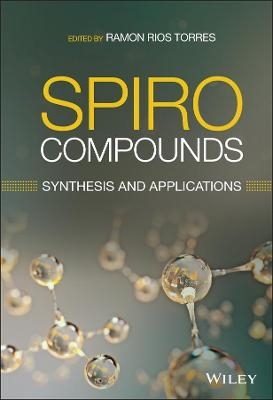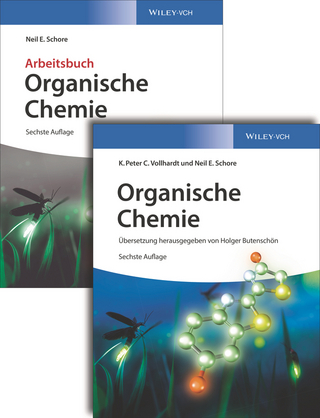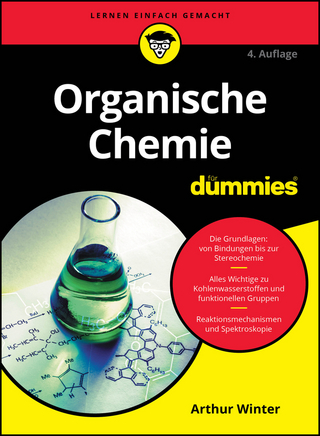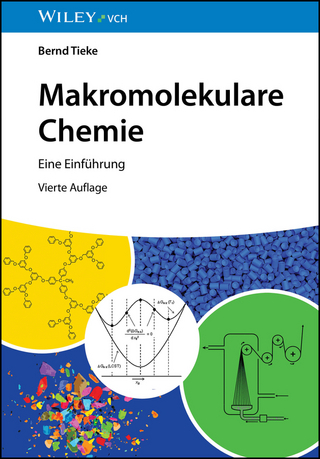
Spiro Compounds
John Wiley & Sons Inc (Verlag)
978-1-119-56763-9 (ISBN)
Spiro Compounds: Synthesis and Applications combines discussions of the latest advances in spiro compound research with the most cutting-edge, real-world applications of that knowledge. This book provides in-depth coverage of the history, significance, properties, synthetic methods, and applications of spiro compounds. As interest in spiro compounds grows due to their unique conformational features and their structural implications on biological systems, Spiro Compounds delivers fulsome treatments of advances in spiro compound synthesis (including stereoselective synthesis) methodologies.
With a special focus on the mechanisms of the reactions that lead to the synthesis of spiro compounds, chapters in the book cover topics such as:
The history, significance, and unique properties of spiro compounds
The most important methodologies for their synthesis
The applications of spiro compounds in organic chemistry, biology, drug discovery
The most important syntheses of natural products bearing a spiro ring
Perfect for academic and industrial chemists, this comprehensive discussion of spirocycles is an indispensable resource for those practicing in the field.
Ramon Rios Torres, PhD is Associate Professor in Organic Chemistry at the University of Southampton. He is the author of more than 130 papers, 18 chapters in chemical books, and a patent. Dr. Rios has edited two books with Wiley: Stereoselective Organocatalysis: Bond Formation Methodologies and Activation Modes and The Pauson-Khand Reaction: Scope, Variations and Applications.
List of Contributors xi
Preface xiii
1 Spiro Compounds: A Brief History 1
Marta Meazza
1.1 Notes on IUPAC Rules for Spiro Compounds 6
References 7
2 Selected Applications of Spirocycles in Medicinal Chemistry 9
Matthias Baud
2.1 Introduction 9
2.2 General Features 15
2.3 Property Optimization in Bioactive Compounds 17
2.4 Four-Membered Rings: Synthesis, Applications, and New Design
Principles 19
2.5 Further Examples 26
2.6 Conclusions 28
References 29
3 Recent Advances in the Asymmetric Synthesis of Spiro Compounds Through Cycloadditions 35
Alberto Vega-Peñaloza, Suva Paria, Luca Dell’Amico, and Xavier Companyó
3.1 Introduction 35
3.2 Organometallic Methodologies 36
3.2.1 Organometallic [3+2] Cycloaddition Strategies to Construct Spiro Compounds 36
3.2.2 Organometallic [4+2] Cycloaddition Strategies to Construct Spiro Compounds 42
3.2.3 Organometallic Miscellaneous Strategies to Construct Spiro
Compounds 44
3.3 Organocatalytic Methodologies 48
3.3.1 Organocatalytic [3+2] Cycloaddition Strategies to Construct Spiro Compounds 48
3.3.2 Organocatalytic [4+2] Cycloaddition Strategies to Construct Spiro Compounds 52
3.3.3 Organocatalytic [4+3] and [2+2] Cycloaddition and Switchable Strategies to Construct Spirocompounds 55
3.3.4 Organocatalytic Miscellaneous Strategies to Construct Spiro Compounds 60
References 62
4 Design and Synthesis of Spirocycles via Olefin Metathesis 65
Sambasivarao Kotha, Vikas R Aswar and Yellaiah Tangella
4.1 Introduction 65
4.2 Formation of Aza-spirocycles 84
4.3 Formation of Oxa-spirocycles 87
4.4 Miscellaneous Examples 97
References 98
5 Spirooxindoles: Synthesis via Organocatalytic Processes 103
Peng-Wei Xu, Xiao-Yuan Cui, Jin-Sheng Yu, and Jian Zhou
5.1 Introduction 103
5.2 Enamine and Iminium Catalysis 105
5.3 Chiral Nucleophilic Catalysis with Tertiary Phosphines or Amines 114
5.4 Chiral N-Heterocyclic Carbene Catalysis 120
5.5 Chiral Tertiary Amine-H-Bond Donor Bifunctional Catalysis 127
5.6 Chiral Hydrogen-Bonding Catalysis 142
5.7 Chiral Phosphoric Acid Catalysis 144
5.8 Chiral Phase-Transfer Catalysis 149
5.9 Chiral Organoiodine Catalysis 151
5.10 Conclusion 153
References 153
6 Spirooxindole Synthesis by Organometallic Processes 161
Albert Moyano
6.1 Introduction 161
6.2 Direct Construction of the Spirooxindole Unit by Cyclization Methodologies 161
6.2.1 Intramolecular Heck Reaction and Related Cyclizations 161
6.2.2 Alkylation–Cyclization of 3-Substituted Oxindoles 167
6.2.3 Cyclization of 3-Substituted Indoles 170
6.3 Two-component Annulation/Cycloaddition Methodologies 171
6.3.1 Cyclopropyl Spirooxindoles by [2+1] Cycloaddition Reactions 171
6.3.2 [2+2] Cycloaddition Reactions 173
6.3.3 [3+2] Annulation/Cycloaddition Reactions 175
6.3.4 [3+3] Cycloaddition Reactions 188
6.3.5 [4+1] Cycloaddition Reactions 189
6.3.6 [4+2] Cycloaddition/Annulation Reactions 190
6.3.7 [5+2] Cycloaddition Reactions 195
6.4 Miscellaneous Methods 195
6.4.1 Darzens Reaction of Isatins 195
6.4.2 Cyclization of 3,3-Disubstituted Oxindoles 198
6.4.3 Three-component Reactions 198
6.5 Conclusions 200
Acknowledgements 200
References 200
7 Enantioselective Synthesis of Spiro Heterocycles 205
Michal Urban and Jan Veselý
7.1 Introduction 205
7.2 Enantioselective Synthesis of Spiro Heterocycle with One Nitrogen Atom 206
7.2.1 Enantioselective Formation of Spiropyrrolidines 206
7.2.1.1 Organometallic Approaches 206
7.2.1.2 Organocatalytic Approaches 208
7.2.1.3 Cooperative-catalytic Approaches 209
7.2.2 Enantioselective Formation of Spirocycles Containing Indoline and Indolenine Ring 210
7.2.2.1 Organometallic Approaches 210
7.2.2.2 Organocatalytic Approaches 211
7.2.3 Enantioselective Formation of Spiropiperidines 214
7.2.3.1 Organometallic Approaches 214
7.2.3.2 Organocatalytic Approaches 216
7.3 Enantioselective Formation of Spirocycles Containing Heterocycle with One Oxygen Atom 218
7.3.1 Enantioselective Formation of Spirocycles Containing Dihydrofuranone and Tetrahydrofuran Ring 218
7.3.1.1 Organometallic Approaches 218
7.3.1.2 Organocatalytic Approaches 221
7.3.2 Enantioselective Formation of Spirocycles Containing Benzofuranone and Benzodihydrofuran Ring 224
7.3.2.1 Organometallic Approaches 224
7.3.2.2 Organocatalytic Approaches 227
7.3.2.3 Cooperative-catalytic Approaches 233
7.3.3 Enantioselective Formation of Spirocycles Containing Dihydrocoumarin, Dihydro- and Tetrahydropyran Ring 234
7.3.3.1 Organometallic Approaches 234
7.3.3.2 Organocatalytic Approaches 236
7.4 Enantioselective Formation of Sulfur-containing Spirocycles 240
7.5 Enantioselective Formation of Spirocycles Containing Heterocycle with More Than One Heteroatom 244
7.5.1 Enantioselective Formation of Spirocycles Containing Pyrazolone Ring 244
7.5.1.1 Organometallic Approaches 244
7.5.1.2 Organocatalytic Approaches 246
7.5.1.3 Cooperative-catalytic Approaches 255
7.5.2 Chapter 7.5.2 – Enantioselective Formation of Spirocycles Containing Barbituric Acid and Hydantoin 256
7.5.3 Chapter 7.5.3 – Enantioselective Formation of Spirocycles Containing Azlactones 259
7.5.3.1 Organometallic Approaches 259
7.5.3.2 Organocatalytic Approaches 259
7.5.3.3 Cooperative-catalytic Approaches 259
7.5.4 Chapter 7.5.4 – Enantioselective Formation of Spirocycles Containing Rhodanines and Sultams 262
7.5.4.1 Organometallic Approaches 262
7.5.4.2 Organocatalytic Approaches 264
7.5.5 Chapter 7.5.5 – Enantioselective Formation of Spiroketals (Spiroacetals) 266
7.5.5.1 Organometallic Approaches 267
7.5.5.2 Organocatalytic Approaches 268
7.5.5.3 Cooperative-catalytic Approaches 269
7.6 Enantioselective Formation of Other Spiro Heterocyclic Systems 270
7.6.1 Organometallic Approaches 270
7.6.1.1 Organocatalytic Approaches 272
7.7 Enantioselective Formation of Bispirocycles 273
7.8 Conclusion 274
Acknowledgements 275
References 275
8 Enantioselective Synthesis of all Carbon Spiro Compounds 283
Ramon Rios
8.1 Enantioselective Synthesis of All-Carbon Spiro Compounds Based on Alkylation Methods 285
8.2 Enantioselective Synthesis of All-Carbon Spirocycles by Metal-catalyzed Methods 286
8.3 Enantioselective Synthesis of All-Carbon Spirocycles by Cycloaddition Strategies 294
8.4 Enantioselective Synthesis of All-Carbon Spirocycles by Radical Strategies 300
8.5 Enantioselective Synthesis of All-Carbon Spirocycles by Cascade Reactions 301
8.6 Enantioselective Synthesis of All-Carbon Spirocycles by Rearrangement Strategies 307
8.7 Conclusions 310
References 310
9 Transition-Metal-Catalyzed Dearomative Spiroannulation Reactions 313
Lu Bai, Jingjing Liu and Xinjun Luan
9.1 Introduction: Discovery of Aromatic Compounds 313
9.2 Development of Dearomatization Reactions 313
9.3 Development of Dearomative Spiroannulation Reactions 314
9.4 Dearomative Spiroannulations of Phenols 314
9.4.1 Dearomative Spiroannulation Without Oxidants 315
9.4.1.1 Dearomative Alkylation of Phenols 315
9.4.1.2 Dearomative Arylation of Phenols 319
9.4.2 C–H Bond Activation/Dearomative Spiroannulation Reactions 325
9.5 Dearomative Spiroannulation of Indoles 332
9.5.1 Intramolecular Dearomative Allylic Alkylation 332
9.5.2 Intramolecular Dearomative Arylation 334
9.5.3 Intermolecular Dearomative Spiroannulation of Indoles 338
9.6 Dearomative Spiroannulation of Aromatic Heterocyclic Compounds 342
9.6.1 Dearomative Spiroannulation of Pyrroles 342
9.6.2 Dearomative Spiroannulation of Furans 344
9.6.3 Dearomative Spiroannulation of Thiophenes 346
9.7 Dearomative of Other Aromatic Compounds 349
9.8 Conclusion 352
References 352
10 Carbocyclic Spiro Compounds Occupying Higher Dimensions: Benzoannelated [5.5.5.5]Fenestranes and Beyond 357
Hak-Fun Chow and Dietmar Kuck
10.1 Introduction 357
10.2 Selected Synthesis Strategies 362
10.2.1 The Access to Benzoannelated Fenestranes 365
10.2.2 Derivatives of [5.5.5.6]-Fenestranones and Fenestrindane 371
10.2.3 Fenestrindanes as a Core Embedded in a Closed π-Electron Periphery 378
10.2.4 Three Spiranes Merged in a Centropolycyclic Framework: Centrohexaindane and Its Derivatives 384
10.3 Conclusions 392
Acknowledgements 394
References 394
11 The Synthesis of Natural Products Containing Spirocycles 401
Ramon Rios
11.1 Porco’s Synthesis of (+)-Calafianin 401
11.2 Hayashi’s Total Synthesis of Pseurotin A 405
11.3 Trost’s Synthesis of (−)-Ushikulide A 408
11.4 Castle’s and Herzon’s Syntheses of (−)Acutumine 412
11.4.1 Castle’s Synthesis of (−)-acutamine 413
11.4.2 Herzon’s Synthesis of (−)-Acutumine 417
11.5 Overman’s and Carreira’s Synthesis of Spirotryprostatin B 421
11.5.1 Overman’s Synthesis of Spirotryprostatin B 421
11.5.2 Carreira’s Synthesis of (−)-Spirotryprostatin B 423
11.6 Conclusion 427
References 427
Index 429
| Erscheinungsdatum | 07.03.2022 |
|---|---|
| Verlagsort | New York |
| Sprache | englisch |
| Maße | 10 x 10 mm |
| Gewicht | 454 g |
| Themenwelt | Naturwissenschaften ► Chemie ► Organische Chemie |
| ISBN-10 | 1-119-56763-7 / 1119567637 |
| ISBN-13 | 978-1-119-56763-9 / 9781119567639 |
| Zustand | Neuware |
| Informationen gemäß Produktsicherheitsverordnung (GPSR) | |
| Haben Sie eine Frage zum Produkt? |
aus dem Bereich


